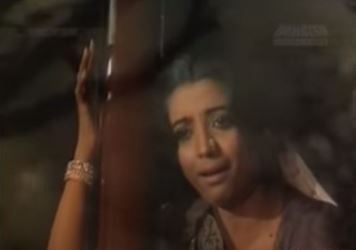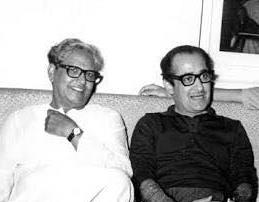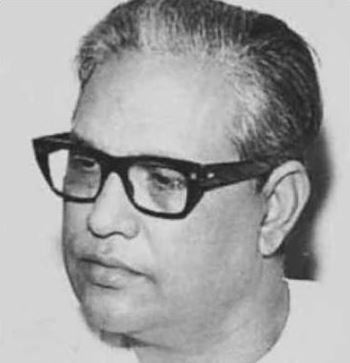Three years ago, celebrating lyricist Majrooh Sultanpuri’s birth centenary on my blog, I wrote that it was a tough ask to select just ten songs from the more than two thousand that he wrote in the course of a film career that spanned a whopping five decades.
For a blog post, restricted (admittedly by its writer) to just ten songs, that can be a challenge; but it is also a challenge for a full-length book to do justice to a colossus of the size and stature of Majrooh. It’s not even as if, when discussing Majrooh, one could get away with just talking about the songs he wrote for Hindi cinema: to be able to portray, with any veracity, not just the poetry of Majrooh but also his personality, the man he was, the work he did, how he thought—all of this requires a lot of research, a lot of organization and careful planning.
Manek Premchand’s Majrooh Sultanpuri: The Poet for All Reasons (Blue Pencil Publishers, 2021) is an ambitious project, an attempt to capture, within the pages of a book, the life and career of one of Hindi cinema music’s greatest personalities.
The book’s introduction is where Premchand provides a biography of Majrooh: his family, his early life, his marriage, how he ended up coming to Bombay and writing songs for cinema, and then, through the decades, how his filmi career progressed. Here are also insights into other aspects of Majrooh’s work: for instance, his famous tirade against Nehru, for which Majrooh had to serve two years in Arthur Road Jail; his non-cinema writing; his versatility.
Beyond this are the chapters that discuss Majrooh’s poetry. There are detailed chapters on ghazals and nazms (in both of which Premchand does an excellent job of explaining the technicalities around these two forms of Urdu poetry), and a very absorbing insight into how Majrooh, a stalwart of the Progressive Writers’ Association, used the ghazal to express the anger and helplessness of the proletariat, a form his fellow poets of the movement refused to believe could be used for anything other than the usual shama-parwana, nazrein-jhukaana style of ‘traditional’ ghazals.
Following this comes what comprises the bulk of the book: chapters on Majrooh’s film songs. One by one, Premchand discusses common tropes, common words, common themes encountered in the songs Majrooh wrote. He provides plenty of examples to illustrate his points (so abundant, in fact, that after a while my eyes began glazing over). There are chapters here on everything from the English words that appear in Majrooh’s songs, to his nok-jhonk songs; from sensual to openly sexual songs; from chiraaghs and diyas in song to surma and kaajal; from songs in Bhojpuri films to Hindi film songs in which Majrooh added Bhojpuri or Awadhi words to heighten the impact. And more.
In the chapter on Majrooh’s Non-Film Poetry, there is a substantial contribution by two writers besides Manek Premchand: brothers Shams Hasan and Farrukh Hasan explain and translate several of Majrooh’s great non-filmi ghazals. Besides this section, there are others too, all individual essays, written by various authors who know their Hindi film music. Lata Jagtiani, Sundeep Pahwa, Antara Nanda Mondal, Deepa Buty, Madhur Trivedi, etc have their chapters appearing near the end of the book, each chapter dealing with Majrooh’s association with a particular film personality. Mostly, these are music directors: SD Burman, Madan Mohan, OP Nayyar, RD Burman, and of course, Majrooh’s own samdhi, his daughter’s father-in-law, Naushad, though there’s also producer-director Nasir Husain included here.
Before the annexures, which include exhaustive lists of Majrooh’s songs, with details of film, year, composer, singer, etc, there are three memorable interviews: one, a long and riveting one with Majrooh himself; another with his son Andalib Sultanpuri; and the third, with Majrooh’s daughter Saba (whose name, it emerges, Majrooh used repeatedly in many of his songs, because she was such a favourite of his) and her husband Raju Naushad.
For me, the interview with Majrooh is the icing on the cake: it shows the man brilliantly, offering a glimpse into how he thought, how he felt towards his colleagues, his family, the industry itself. It’s an eye-opener, and gave me an even greater respect for Majrooh. He comes across as such a no-nonsense man, so sure of his own talent and skill, but at the same time so honest. And also so very well-read, a true litterateur.
I must admit I found the long lists of songs and lines from songs through the bulk of the book somewhat tedious. But then, if I hadn’t insisted on reading all of those, they wouldn’t have palled. And, also, the fact is that these are a reflection of just how well-researched this book is. (Even when I was ploughing through those lengthy lists, I couldn’t help thinking: “This would be very useful in compiling song lists for blog posts!”)
Note that Premchand assumes his readers know Hindustani, which is why, for most of the book, no translations are provided. A couple of the contributing writers (notably, the Hasan brothers) provide translations of Majrooh’s work, and in the chapters on ghazals and nazms, some of the more Persianized Urdu words are translated for the benefit of the average reader.
This is a point that becomes important when you take into consideration the fact that the bulk of the interviews are in Hindustani (though transcribed in Roman Urdu). Not knowing the language may not make much of a difference when it comes to the rest of the book, since subtitled lyrics of the songs discussed may be found online, but the interviews will be impossible to understand if you don’t know Hindustani.
On the whole, a pretty definitive guide to Majrooh and his work, and a book I liked a lot. I learnt a good deal I hadn’t known before, and I found myself looking at many of Majrooh’s songs with new understanding.






Hmm… interesting. [I will tell you why later.] it’s been some time since I have read a biography that’s as good as you say this is. Thanks for the review, Madhu.
LikeLike
Now I’m curious! Tell, tell. :-)
It’s a biography, yes, but I think more than a biography it’s an insight into his work – which is of course mammoth.
LikeLike
curious …
LikeLike
Oh!
What a well written review! I’m sure the book would be as beautiful as the review.
Should be getting it. Would be on amazon, I guess!
Thank you for the review.
:-)
LikeLike
Hey Madhu,
To quote you: “It’s a biography, yes, but I think more than a biography it’s an insight into his work – which is of course mammoth”.
Thank you for an insightful review of the book!
Praba Mahajan
LikeLike
I’m so glad you enjoyed this, Praba. Thank you so much for the kind words.
LikeLike
Thank you, Anupji! I think for someone as deeply interested in film music as you are, this book might be a good read.
LikeLike
That’s an admirable review of a seemingly very good book on the immortal Shaayar who, by good luck of Hindi cine music, became a lyricist for Bollywood movies. Rightly asserted that he was a true litterateur. Hats off to Manek Premchand and all those who contributed to this book. And hearty thanks to you for introducing your readers to it. His son Andalib directed Jaanam Samjha Karo (1999) which is quite a good movie (in my view, of course) whose one song Sabki Baaraten Aaeen (written by Majrooh only) is very close to my heart. Finally (in Majrooh’s own words), Rok Sakta Hai Hamein Zindaan-e-Bala Kya Majrooh, Hum To Aawaaz Hain, Deewaar Se Chhan Jaate Hain.
LikeLike
Thank you so much, Jitendraji, for reading and commenting. And especially a big thank you for that last quote – so apt!
LikeLiked by 1 person
Interesting…Majrooh, Sahir, Hasrat Jaipuri, Shakeel Badauni, Kaifi Azmi, Qamar Jallalabadi…guess the hows and whats of Bollywood lyrics being dominated by Muslims many of them avowedly leftists, along with music directors like Naushad, S D Burman, Madan Mohan, Salil Choudhri, S-J, Roshan…whose collaboration created such a fine literary and musical heritage that can make a civilization proud is yet to be explored in all its complexity and nuance. That the film industry itself represented bourgeois vulgarity and excesses in a socialist India, how easily or troublingly did it sit with these lyricists integrity and politics…and what did these contradictions say about them? Yet in fact the lyrics and music is what redeemed these Bollywood films which otherwise were often bereft of artistic finesse and cinematic sensibility – unless of course you were talking about a Bimal Roy, Guru Dutt, Vijay Anand, Hrishikesh Mukherjee and few more. And then there were rivalries and ego clashes too between them I learn. Does this book touch upon these at some levels? Do suggest some other works if in the know which somewhere deals with the above issues going beyond the hagiographic or genuflective🙏🏽.
LikeLike
You are so right. But unfortunately, I can’t offhand think of books that discuss the industry as a whole, in an unbiased, unprejudiced style. There are books – biographies, even – that I think do a fairly good job of being unbiased (Gautam Chintamani’s biography of Rajesh Khanna, Jerry Pinto’s bio of Helen, Akshay Manwani’s bio of Nasir Husain), but then these, by the very fact that they focus on just one person rather than the industry as a whole, tend to not provide a large-scale view of industry dynamics, other than where these (perhaps) affected the person in question.
LikeLike
Real name of Qamar Jalalabadi (1919-2003) is OM PRAKASH BHANDARI. He was a deeply religious Hindu, a Brahmin at that! He could recite the Hindu scriptures by heart, and because of his early schooling in a Madrassa, he was equally adept at reciting the Holy Quran. The Bible he studied on his own later.
PARTHA CHANDA
LikeLike
oh…thanks for the correction @asapmar 🙏🏽
LikeLike